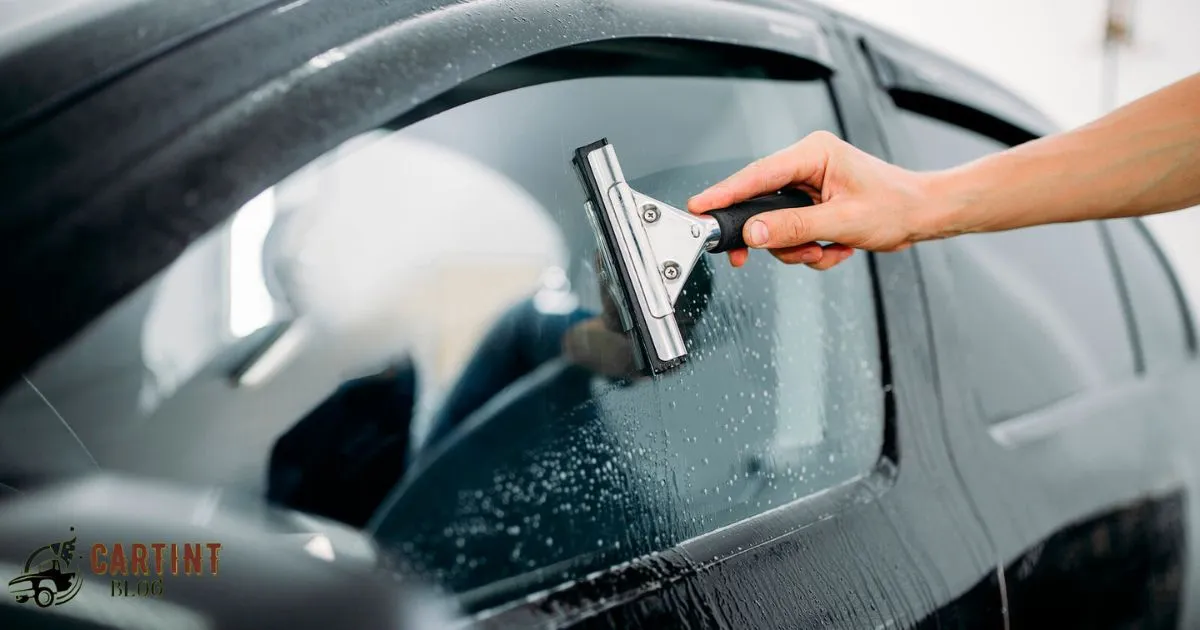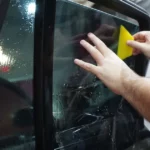Solar tinted glass on cars is specially treated glass that reduces sunlight and heat penetration into the vehicle. It helps block harmful UV rays, protecting the interior from fading and damage. This tinted glass also aids in regulating the car’s internal temperature, making it more comfortable for passengers.
Curious about what makes a car’s interior stay cool and protected from the sun’s glare? Discover the answer with What Is Solar Tinted Glass On Cars? This specialized glass isn’t just about aesthetics it’s the secret to blocking harmful rays, keeping your vehicle comfortable.
Stay with us to uncover the benefits of this specially treated glass that not only reduces heat and glare but also shields your vehicle’s interior from damaging UV rays. It enhances comfort, preserves your car’s aesthetics, and provides added privacy, making every drive a more enjoyable experience.
The Basics Of Solar Tinted Glass
Solar tinted glass is a specialized type of glass used in vehicles. It blocks harmful UV rays and reduces the amount of heat entering the car, making the interior more comfortable. This glass also adds a layer of privacy by limiting visibility into the vehicle while on the road.
The tinting process involves treating the glass with a special film or coating that absorbs or reflects sunlight. This helps in maintaining the car’s internal temperature and protects the upholstery from fading due to sun exposure. Overall, solar tinted glass enhances both comfort and protection within the vehicle.
Composition And Manufacturing Process
The glass is treated with a special film or coating that helps in blocking sunlight, UV rays, and heat from penetrating the vehicle’s interior. This film or coating is usually made of multiple layers, including materials like dyes, metals, or ceramics, depending on the desired level of tint and performance.
Levels Of Tint
Tint levels can range from very light, allowing more light transmission, to very dark, significantly reducing light transmission into the vehicle. Different states and countries often have regulations specifying the permissible VLT percentages for car windows to ensure safety and visibility standards are met on the roads.
Origins And Technological Advancements
The origins of technological advancements in various fields trace back centuries. Innovations continually evolve, driven by human curiosity and the need for progress. These advancements encompass diverse areas like medicine, transportation, and communication, shaping our modern world.
In recent years, technology has surged forward at an unprecedented pace. Breakthroughs in artificial intelligence, renewable energy, and biotechnology have revolutionized industries worldwide. These advancements, fueled by relentless research and collaboration, promise to redefine how we live, work, and interact in the coming years.
Early Days Of Tinted Glass
Tinted glass has its roots dating back to the early 1900s when it was primarily used for aesthetic purposes in architectural designs. It provided a slight tint, reducing glare and improving privacy. Its heat and UV blocking capabilities were limited.
Emergence Of Solar Control Films
These films were developed to improve heat rejection and UV protection, making them a popular addition to automotive and architectural applications. They used advanced materials to enhance both the aesthetic appeal and functional aspects of tinted glass.
Technological Components
They often consist of multiple layers, including polyester film, adhesives, and coatings infused with metals or ceramics. These layers work synergistically to block UV rays, reduce heat transmission, and enhance the overall durability and performance of tinted glass, offering improved comfort and protection in various settings.
Car window tint to reduce heat
Car window tint reduces heat by blocking sunlight from entering the vehicle. It helps to keep the interior cooler, making drives more comfortable during hot weather. Tinted windows also minimize the need for excessive air conditioning, potentially saving fuel.
Tinted windows act as a barrier against the sun’s rays, reducing the greenhouse effect inside the car. They work by limiting the amount of solar energy that penetrates the glass, preventing excessive heat buildup. This feature not only enhances comfort but also protects the car’s interior from sun damage and fading.
Car window tint to reduce glare
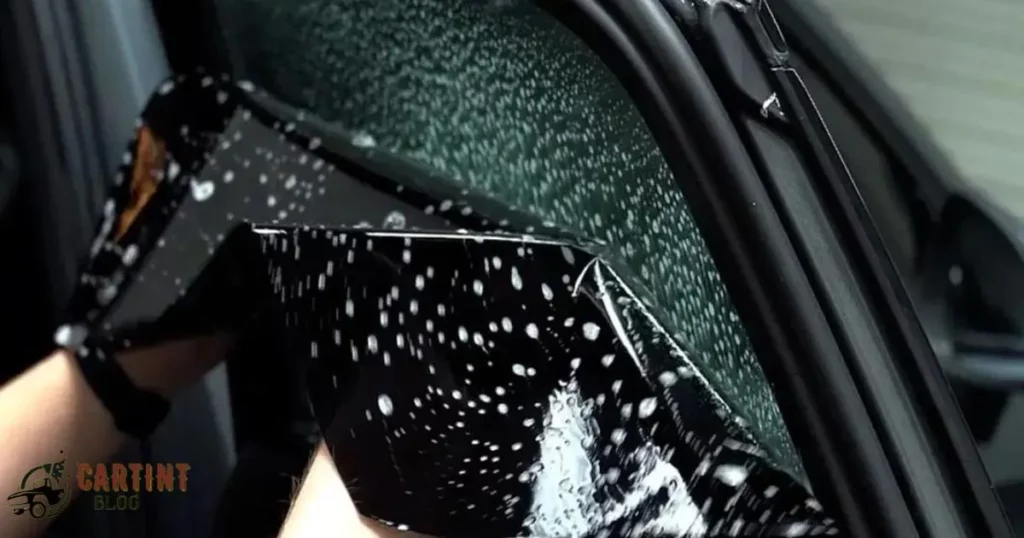
Car window tint reduces glare by blocking excess sunlight, making driving safer and more comfortable. It decreases the sun’s brightness, enhancing visibility without causing strain on the eyes. Tinted windows also aid in preventing distractions caused by intense glare, ensuring a smoother and more focused driving experience.
By applying window tint to your car, you diminish the harshness of direct sunlight, creating a more pleasant environment inside the vehicle. The tint film reduces the reflection of light off surfaces, reducing glare and allowing for better concentration on the road ahead, especially during bright and sunny conditions.
How Solar Tinting Works?
Solar tinting works by applying a thin film to the car’s windows. This film is typically made of polyester and incorporates special dyes or metals that absorb or reflect sunlight. When sunlight hits the tinted windows, the film absorbs some of the heat and blocks a portion of the sun’s UV rays.
This process prevents the interior from heating up excessively and protects passengers from harmful UV radiation.The tinting film is installed by cleaning the window surface thoroughly and then carefully applying the film using a solution. Once applied, the film adheres to the glass, providing a layer of protection.
This process allows for better temperature regulation inside the car, reducing the need for excessive air conditioning and helping to preserve the vehicle’s interior from sun damage over time.
Uv Ray Blockage
It works by absorbing or reflecting UV rays, reducing their penetration into the vehicle. This helps in protecting passengers from harmful UV radiation.
Visible Light Regulation
The tinted film controls the amount of visible light that enters the car. It prevents excessive brightness while maintaining adequate visibility for the driver and passengers.
Infrared Radiation Reduction
The tinted film controls the amount of visible light that enters the car. It prevents excessive brightness while maintaining adequate visibility for the driver and passengers.
Applications Of Solar Tinted Glass
Solar tinted glass finds diverse applications across various industries. In architecture, it’s used to reduce heat gain, control glare, and enhance energy efficiency in buildings. This type of glass also aids in maintaining privacy without compromising natural light, making it a popular choice for homes and offices.
In automotive engineering, Dark Is 35 Window Tint amplifies the benefits of solar tinted glass. It significantly reduces UV rays, ensuring a cooler interior and shielding against fading. This tint augments vehicle aesthetics, creating a comfortable, protected environment for occupants.
Commercial Buildings
They provide spaces for companies to operate, cater to customers, and conduct various activities. These structures often feature diverse designs and functionalities to meet the needs of different industries, promoting productivity and facilitating economic activities within communities.
With their distinct architectures and purposes, commercial buildings play vital roles in cityscapes, contributing to the urban landscape’s diversity. They serve as landmarks, housing companies that drive local economies and offering convenient locations for people to access goods and services.
Architectural Design
Architectural design encompasses the planning and creation of structures, focusing on aesthetics, functionality, and safety. It involves the conceptualization and execution of buildings, considering factors like form, materials, and spatial organization.
Residential Use
Residential architecture involves designing and constructing spaces for people to live in, including houses, apartments, and other dwellings. It aims to create comfortable, functional, and aesthetically pleasing homes that cater to the needs and lifestyles of residents.
Commercial And Office Spaces
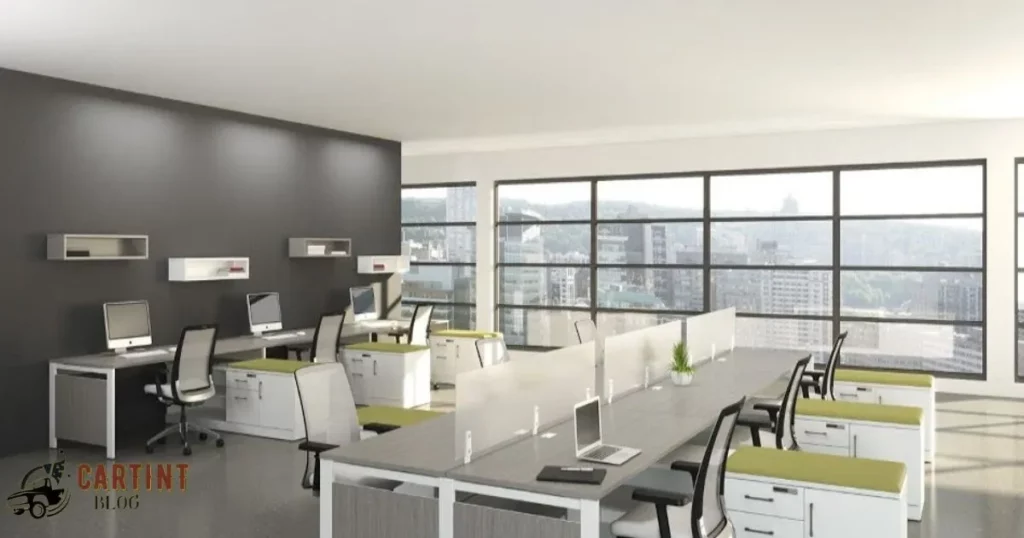
Designing commercial and office spaces involves creating environments conducive to business operations. These spaces cater to various industries, offering functional layouts, efficient work areas, and appealing settings that support productivity and client interactions.
Automotive Industry
In architecture, the automotive industry involves designing spaces such as showrooms, manufacturing plants, and service centres. These spaces require specialized layouts and structures tailored to the needs of vehicle display, production, and maintenance.
Specialized Applications
Specialized architectural applications refer to unique and specific design requirements for various purposes, such as healthcare facilities, educational institutions, cultural centres, and recreational spaces. These applications demand tailored designs to meet the specific needs of each environment.
Advantages Of Solar Tinted Glass
Solar tinted glass offers numerous benefits. It blocks harmful UV rays, safeguarding passengers from potential skin damage and reducing the risk of interior upholstery fading. Secondly, it minimizes heat buildup inside the car, ensuring a more comfortable ride, especially during hot weather.
Solar tinted glass enhances privacy by making it harder for outsiders to peer into the vehicle, providing a sense of security while on the road.Another advantage of solar tinted glass is its ability to improve fuel efficiency by reducing the need for excessive air conditioning. By keeping the interior cooler, it lessens the reliance on air conditioning systems, thereby lowering fuel consumption.
- Preservation of Interior Furnishings: It shields the interior from harsh sunlight, reducing fading and deterioration of upholstery and dashboard materials.
- Energy Efficiency: By minimizing heat buildup, it decreases the need for excessive air conditioning, contributing to fuel efficiency.
- UV Protection: It blocks harmful UV rays, safeguarding passengers and preventing skin damage.
- Glare Reduction: It diminishes glare, enhancing visibility and comfort while driving.
- Enhanced Privacy: It provides a level of privacy by limiting visibility into the vehicle’s interior, offering a sense of security for occupants
Disadvantages Of Solar Tinted Glass
- Decreased Nighttime Visibility: Tinted glass may reduce visibility at night, especially in poorly lit areas.
- Potential Legal Restrictions: Some regions have regulations regarding the darkness of tinted glass, which might lead to legal issues if not compliant.
- Interference with Electronic Devices: Tinting may interfere with electronic signals, such as GPS or radio reception.
- Installation Challenges: Installing tinted glass requires expertise and might pose challenges during installation, leading to improper application.
- Higher Cost: Tinted glass options typically come at an additional cost compared to standard glass.
Functional Aspects Of Solar Tinted Glass
Solar tinted glass serves various functions beyond just aesthetics. It actively blocks the sun’s harsh UV rays, safeguarding the car’s interior from damage and fading. This specialized glass also regulates the internal temperature, keeping the cabin cooler during scorching days, enhancing comfort for passengers.
Solar tinted glass adds an element of privacy by reducing visibility into the vehicle’s interior. It achieves this without compromising the clarity of vision for those inside the car, creating a more secure and pleasant driving experience overall.
Heat Reduction
Solar tinted glass helps to minimize the amount of heat that enters the car, creating a more comfortable interior temperature. By blocking a significant portion of the sun’s infrared radiation, it reduces the greenhouse effect inside the vehicle, making it cooler, especially during hot weather.
Uv Radiation Protection
This specialized glass also acts as a barrier against harmful UV rays. It helps to block a considerable percentage of UV radiation from penetrating the windows, safeguarding the car’s interior materials and occupants from UV-related damage.
Environmental Impact And Sustainability
The environmental impact of our actions is crucial. When we discuss sustainability, we focus on how our choices affect the planet. It’s about using resources wisely and ensuring they’re available for future generations.
Sustainability means making choices that minimize harm to the environment. It involves reducing waste, conserving resources, and finding renewable alternatives. By prioritizing sustainability, we create a healthier planet for everyone.
Reduced Carbon Footprint
Reduced Carbon Footprint refers to minimizing the amount of carbon dioxide and other greenhouse gases released into the atmosphere. It involves adopting practices and technologies that decrease the overall emissions generated by human activities.
Green Building Certification
Green Building Certification is a process where buildings are evaluated for their environmental impact and sustainability. Certifications like LEED (Leadership in Energy and Environmental Design) assess factors like energy efficiency, water usage, materials, and indoor environmental quality to ensure buildings meet certain eco-friendly standards.
Challenges And Considerations

When dealing with challenges and considerations, it’s crucial to stay proactive. Understanding the hurdles ahead helps in planning for success. From budget constraints to technological advancements, each aspect demands attention for effective problem-solving.
Considerations in any task involve weighing options carefully. Whether it’s balancing costs or embracing innovation, making informed decisions is key. Addressing challenges head-on and factoring in various considerations pave the way for sustainable solutions and growth.
Installation And Maintenance
Installing any system or product properly is critical for its optimal functioning. In the case of various technologies or equipment, including solar panels, cars’ tinted glass, or any regulated systems, adherence to installation guidelines ensures efficiency and longevity. Regular maintenance, including inspections and servicing, is equally vital.
Regulatory Compliance
In the context of installation or maintenance services, compliance ensures safety, quality, and environmental responsibility. Following regulations also avoids legal repercussions and fosters trust among customers, showcasing a commitment to meeting industry standards and ensuring the well-being of both consumers and the environment.
Future Innovations And Trends
Electric and autonomous vehicles are shaping the transportation landscape, promising safer and greener commutes. Sustainable practices like renewable energy and eco-friendly materials will dominate industries, paving the way for a more environmentally conscious future.
The rise of smart cities will optimize resources and enhance urban living through interconnected systems. Space exploration will continue to expand, with plans for Mars missions and ambitious endeavors driving scientific progress and inspiring generations.
Smart Tinting Technology
Smart tinting technology refers to a dynamic feature incorporated into glass that allows it to change its tint or transparency in response to external stimuli. This innovation provides control over the amount of light, heat, and glare passing through windows or glass surfaces.
Integration With Building Automation Systems
This integration allows for seamless control and management of the tinting process based on predetermined settings, environmental conditions, or user preferences. Building automation systems can regulate smart tinting in response to factors like sunlight intensity, time of day, or temperature changes.
Which Tint Shade Is Right For You?
Choosing the right tint shade for your car is crucial. The level of darkness varies, so it’s important to consider your preferences and local regulations. A lighter tint offers more visibility but less privacy, while a darker one provides better privacy but might reduce visibility, so finding a balance that suits your needs and adheres to the law is key.
Different tint shades cater to different needs. If you prioritize visibility and minimal privacy, a lighter tint might be your best bet. For enhanced privacy and sun protection, a darker tint could be the choice for you. Always ensure the tint shade you select aligns with both your preferences and legal guidelines in your area.
Factory Tinted Windows Vs Aftermarket Window Tinting
| Aspect | Factory Tinted Windows | Aftermarket Window Tinting |
| Origin | Installed during manufacturing | Applied after purchase |
| Consistency | Usually consistent across all windows | May vary based on installer |
| Appearance | Integrated, often lighter tint | Options for varying darkness |
| Warranty | Typically covered by vehicle warranty | Dependent on installer’s warranty |
| Cost | Included in initial vehicle cost | Additional cost post-purchase |
| Customization | Limited options for customization | Wide range of tint choices |
Which Tint Shade Is Right For You?
Darker tint shades provide more privacy compared to lighter ones, which may be ideal for some. Secondly, consider the legal regulations in your area regarding window tint darkness. Each state or region has its own rules, so ensure your chosen tint shade complies with these regulations to avoid fines or penalties.
Ponder upon the primary purpose of the tint. If you’re aiming to reduce glare and heat, a medium shade could strike the right balance. On the other hand, if protecting your vehicle’s interior from UV rays is crucial, a darker tint might be more suitable. Understanding your priorities will help you determine which tint shade suits your needs best.
Solar Window Tint For Windshields
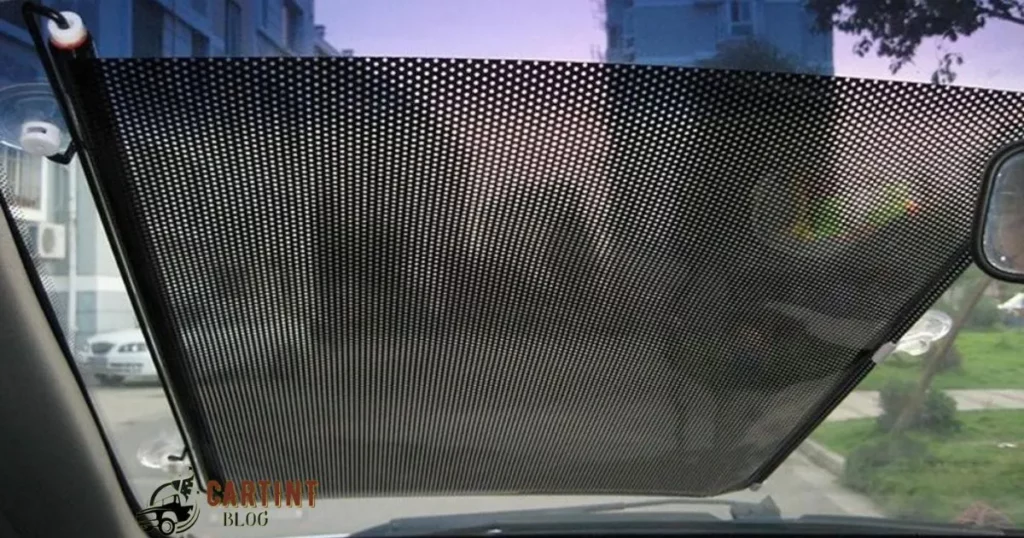
Solar window tint for windshields adds a protective layer to your car’s front glass. It blocks sunlight, reducing glare and keeping the interior cooler. This tint enhances visibility during the day while safeguarding against UV rays, making your driving experience more comfortable and safer.
It’s a practical addition that minimizes heat buildup inside the vehicle. This tinting solution also aids in preserving the dashboard and upholstery by shielding them from the damaging effects of prolonged sun exposure.
How Does Solar Tint Improve Your Driving Experience?
Solar tint enhances your driving experience by reducing glare from the sun, making it easier to see the road. It also helps maintain a comfortable temperature inside the car by blocking excessive heat, ensuring a more pleasant ride.
The regulated temperature inside the car ensures that you and your passengers remain comfortable, regardless of external weather. With solar tint’s ability to block UV rays, you not only protect your skin from potential damage but also maintain the upholstery’s quality, ensuring a more enjoyable and lasting driving experience.
What Are The Benefits Of Solar Tint Window Films?
- Heat Reduction: Solar tint window films effectively reduce heat, keeping the interior cooler and more comfortable.
- UV Protection: They block harmful UV rays, safeguarding your skin and preventing interior fading and damage.
- Glare Reduction: These films minimize glare, improving visibility and reducing eye strain while driving.
- Energy Efficiency: By reducing the need for air conditioning, they contribute to energy savings.
- Privacy Enhancement: Solar tint films enhance privacy by making it difficult to see inside the vehicle.
- Interior Preservation: They help prolong the lifespan of upholstery and dashboard materials by shielding them from sun damage.
- Safety: Improved visibility and reduced glare contribute to safer driving conditions.
- Customization: These films come in various shades and styles, allowing for personalized aesthetics.
FAQ’s
What is solar glass on a car?
Solar glass is treated to block UV rays, regulate heat, and enhance privacy, providing a more comfortable driving experience.
Which is better, solar screens or window tinting?
Both offer benefits: solar screens block heat effectively, while tinting provides UV protection and privacy. It depends on your preferences.
Does solar glass have a tint?
Yes, solar glass is tinted to reduce glare, heat, and UV rays while maintaining visibility and enhancing comfort inside the car.
Conclusion
From reducing glare and heat to blocking harmful UV rays, this tinted glass contributes significantly to a more comfortable and safer driving experience. It not only protects the vehicle’s interior from fading but also maintains a regulated temperature inside the car, making journeys more pleasant for occupants.
In essence, What Is Solar Tinted Glass On Cars? It’s more than just a cosmetic enhancement; it’s a practical addition that improves driving conditions. Whether it’s enhancing visibility, preserving the car’s interior, or ensuring a cooler cabin, solar tinted glass plays a pivotal role.

